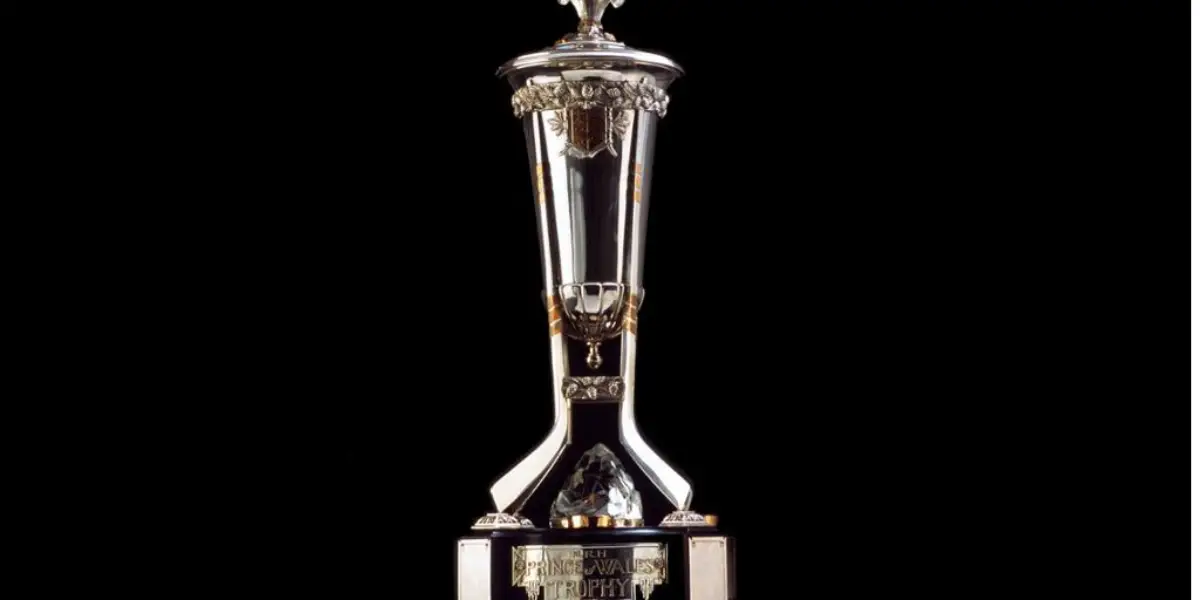
The Prince of Wales Trophy is an award presented annually by the National Hockey League (NHL) to the Eastern Conference playoff champions. It is named in honor of the Prince of Wales, who was a member of the British royal family at the time the trophy was first presented in 1925. The trophy is one of the oldest in professional sports, and it has a rich history that spans nearly a century.
The Prince of Wales Trophy was originally created to recognize the champions of the first-ever NHL playoffs. The inaugural playoff series was held in 1925, and it featured the Montreal Canadiens, the Toronto St. Patricks (now known as the Maple Leafs), the Ottawa Senators, and the Montreal Maroons. The Canadiens emerged as the champions of the series, and they were presented with the Prince of Wales Trophy as a symbol of their accomplishment.
Since then, the Prince of Wales Trophy has been presented to the Eastern Conference champions every year. The trophy has gone through a number of changes over the years, but its basic design has remained the same. The trophy is made of sterling silver and stands 24 inches tall. It features a large bowl at the top, which is adorned with the NHL shield and the Prince of Wales crown. The bowl is supported by a three-tiered base, which is inscribed with the names of all the previous winners of the trophy.
In addition to serving as a symbol of Eastern Conference dominance, the Prince of Wales Trophy also holds a special significance in the NHL playoffs. Unlike the Stanley Cup, which is awarded to the ultimate champions of the league, the Prince of Wales Trophy is often viewed as a “jinx” or a bad omen for the team that wins it. The superstition dates back to 1941, when the Boston Bruins won the trophy but went on to lose the Stanley Cup Finals to the Detroit Red Wings. Since then, several teams that have won the Prince of Wales Trophy have gone on to lose in the Stanley Cup Finals, leading some players and fans to avoid touching or celebrating with the trophy.
Despite the superstition surrounding the trophy, many NHL players and fans consider it to be a prestigious and meaningful award. Winning the Prince of Wales Trophy represents a significant achievement in the NHL playoffs, and it is a testament to a team’s talent, perseverance, and commitment to excellence. The trophy is also a reminder of the rich history and tradition of the NHL, and it serves as a link between the past and the present of the league.
In recent years, the presentation of the Prince of Wales Trophy has taken on a more formal and ceremonial tone. The NHL typically invites a special guest to present the trophy to the Eastern Conference champions, and the presentation is often accompanied by music, lights, and other special effects. The presentation of the trophy has become a highly anticipated moment for NHL fans, and it is a reminder of the excitement and drama of playoff hockey.
In conclusion, the Prince of Wales Trophy is a storied and significant award in the National Hockey League. It represents excellence and achievement in the Eastern Conference playoffs, and it is a symbol of the rich history and tradition of the NHL. Despite the superstitions surrounding the trophy, it remains a highly coveted prize for NHL players and teams, and winning it is a significant accomplishment in the world of professional hockey. As the NHL continues to evolve and grow, the Prince of Wales Trophy will remain an enduring symbol of the league’s past, present, and future.
• 1925 – Montreal Canadiens
• 1926 – Montreal Maroons
• 1927 – Ottawa Senators
• 1928 – New York Rangers
• 1929 – Boston Bruins
• 1930 – Boston Bruins
• 1931 – Boston Bruins
• 1932 – New York Rangers
• 1933 – New York Rangers
• 1934 – Detroit Red Wings
• 1935 – Montreal Maroons
• 1936 – Detroit Red Wings
• 1937 – Detroit Red Wings
• 1938 – Boston Bruins
• 1939 – Boston Bruins
• 1940 – Boston Bruins
• 1941 – Boston Bruins
• 1942 – Boston Bruins
• 1943 – Detroit Red Wings
• 1944 – Montreal Canadiens
• 1945 – Detroit Red Wings
• 1946 – Montreal Canadiens
• 1947 – Toronto Maple Leafs
• 1948 – Toronto Maple Leafs
• 1949 – Toronto Maple Leafs
• 1950 – Detroit Red Wings
• 1951 – Toronto Maple Leafs
• 1952 – Detroit Red Wings
• 1953 – Montreal Canadiens
• 1954 – Detroit Red Wings
• 1955 – Detroit Red Wings
• 1956 – Montreal Canadiens
• 1957 – Montreal Canadiens
• 1958 – Montreal Canadiens
• 1959 – Montreal Canadiens
• 1960 – Montreal Canadiens
• 1961 – Montreal Canadiens
• 1962 – Toronto Maple Leafs
• 1963 – Toronto Maple Leafs
• 1964 – Montreal Canadiens
• 1965 – Montreal Canadiens
• 1966 – Montreal Canadiens
• 1967 – Toronto Maple Leafs
• 1968 – Montreal Canadiens
• 1969 – Montreal Canadiens
• 1970 – Boston Bruins
• 1971 – Boston Bruins
• 1972 – Boston Bruins
• 1973 – Montreal Canadiens
• 1974 – Boston Bruins
• 1975 – Philadelphia Flyers
• 1976 – Montreal Canadiens
• 1977 – Montreal Canadiens
• 1978 – Boston Bruins
• 1979 – Montreal Canadiens
• 1980 – Philadelphia Flyers
• 1981 – New York Islanders
• 1982 – New York Islanders
• 1983 – New York Islanders
• 1984 – New York Islanders
• 1985 – Philadelphia Flyers
• 1986 – Montreal Canadiens
• 1987 – Philadelphia Flyers
• 1988 – Boston Bruins
• 1989 – Montreal Canadiens
• 1990 – Boston Bruins
• 1991 – Pittsburgh Penguins
• 1992 – Pittsburgh Penguins
• 1993 – Montreal Canadiens
• 1994 – New York Rangers
• 1995 – New Jersey Devils
• 1996 – Florida Panthers
• 1997 – Philadelphia Flyers
• 1998 – Washington Capitals
• 1999 – Buffalo Sabres
• 2000 – New Jersey Devils
• 2001 – New Jersey Devils
• 2002 – Carolina Hurricanes
• 2003 – New Jersey Devils
• 2004 – Tampa Bay Lightning
• 2005 – No winner (lockout)
• 2006 – Carolina Hurricanes
• 2007 – Ottawa Senators
• 2008 – Pittsburgh Penguins
• 2009 – Pittsburgh Penguins
• 2010 – Philadelphia Flyers
• 2011 – Boston Bruins
• 2012 – New Jersey Devils
• 2013 – Boston Bruins
• 2014 – New York Rangers
• 2015 – Tampa Bay Lightning
• 2016 – Pittsburgh Penguins
• 2017 – Pittsburgh Penguins
• 2018 – Washington Capitals
• 2019 – Boston Bruins
• 2020 – Tampa Bay Lightning
• 2021 – Tampa Bay Lightning
• 2022 – Tampa Bay Lightning

Stanley Cup Aspirations – Cue’ the Duck Boats Pod
Discover more from Inside The Rink
Subscribe to get the latest posts sent to your email.



